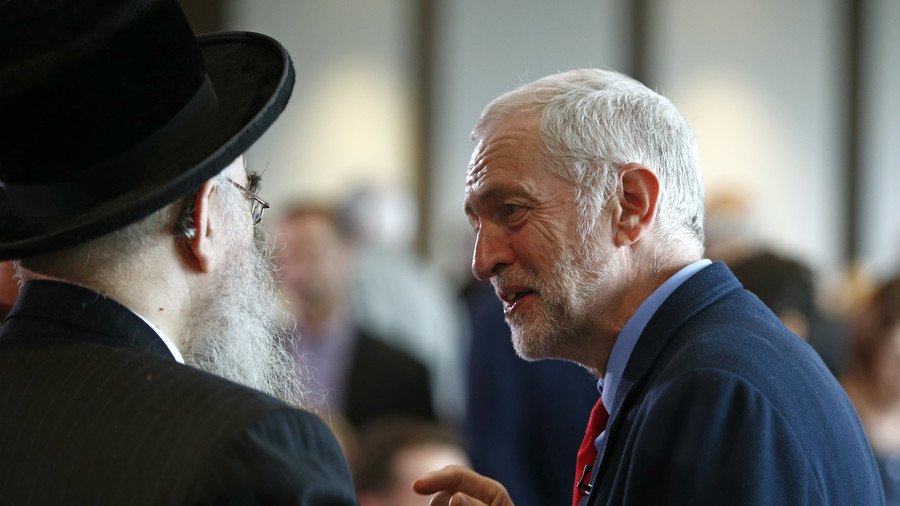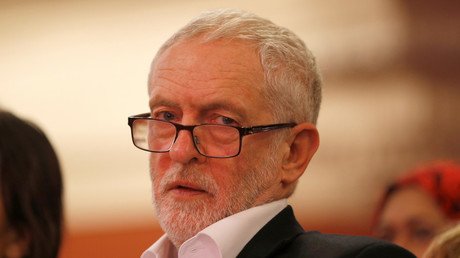Is Labour's anti-Semitism 'crisis' fair criticism or used for political gain?

Tuesday's anti-Semitism debate in parliament focused primarily on the "crisis" within Corbyn's Labour Party, going by MSM reporting. Has the issue really got out of control or has it been exaggerated for political gain?
Sajid Javid, the communities secretary, set the tone by opening the debate on anti-Semitism with an attack on Jeremy Corbyn, telling the speaker of the house that the UK Labour leader had demonstrated a "worrying lack of leadership and moral clarity" on the issue.
Then MPs shared their own personal experiences of anti-Semitism, none more shocking than the account from MP Luciana Berger, who received a round of applause for her speech documenting "a torrent of anti-Semitic abuse" that had been directed her way, primarily during her time as an MP.
Four people have been convicted over anti-Semitic abuse aimed at the Labour Co-op MP for Liverpool Wavertree since 2013. She told an attentive House of Commons that "three have been imprisoned of a far-right persuasion, including a member of the now proscribed National Action Organization."
In her harrowing account of anti-Semitic abuse, she leveled criticism at her own party over the issue, saying: "Within the Labour Party, anti-Semitism is now more commonplace it is more conspicuous, it is more corrosive." Adding that "my party urgently needs to address this issue, publicly and consistently, and we need to expel those people from our ranks that hold these views including Ken Livingstone." This was met with cheers, particularly from her own Labour colleagues.
Berger would be the first of many Labour MPs to denounce the attitudes of some Labour members. John Mann, Labour MP for Bassetlaw, lambasted those who claim the calling-out of anti-Semitism is a way of attacking Corbyn. He said: "Those who say it is a smear raising this issue need to publicly apologize and publicly understand what they are doing."
So, is it a clear-cut issue that the UK Labour Party has been infected with anti-Semites and is it a party ravaged by racism? Should the British public now be looking to the Conservatives for moral leadership?
Well, during the debate, Labour politicians were warned not to indulge in 'whataboutery.' Labour MP Karen Lee was told to "sit down" during an intervention in a speech by Tory MP Graham Brady to ask "Do you think it's appropriate for members of this chamber, for instance, to use the N-word? I mean, I would condemn all forms of racism, would you agree?"
Lee was referring to Conservative MP Anne Marie Morris' use of the 'N-word.' The MP was suspended by the Conservatives, but has since been readmitted. Her intervention may have been assessed by some as 'whataboutery,' but is there a wider point to be made about the Tories seemingly wanting to claim the moral high ground on issues of racism such as anti-Semitism?
READ MORE: Weaponizing anti-Semitism against Corbyn could endanger Jews, Israeli academic warns
A 2017 Yougov survey for Campaign Against Antisemitism (CAA) found that 40 percent of Conservative voters were found to hold at least one anti-Semitic statement, compared to 32 percent of Labour voters.
In a recent interview with the Jewish Chronicle here in the UK, Corbyn outlined the scale of the problem, detailing specific numbers of anti-Semitic cases within the Labour Party to give an accurate picture of the state of the problem.
He stated: "Of the Labour Party cases, some of which I inherited on becoming leader, there's been 300 references since 2015, 60 are still under investigation, 24 have gone to the National Constitutional Committee, 24, roughly, went to a final warning, and 150 were either expelled or resigned. That represents 0.02 percent of the party membership."
Jeremy Corbyn says when he first became Labour leader: - He inherited 300 antisemitic cases- 60 are still under investigation- 24 have gone to NEC- 24 roughly, went to a final warning- 150 were either expelled or resignedThere are other cases pending.#BBCqt#Marr#Pestonpic.twitter.com/0FdeZOgG6a
— C0RBYNAT0R (@Corbynator2) March 28, 2018
So 0.02 percent of the Labour membership have either been found guilty, are under investigation, or have been given a final warning concerning anti-Semitic behavior. To put that into perspective, the 2017 Yougov survey for CAA found that 36 percent of British adults harbor some form of anti-Semitic views; that's down from 45 percent in 2015.
Based on the figures outlined, it would suggest that there are indeed issues of anti-Semitism within UK Labour, but what would appear to be not so clear is that we can confidently assert that there is a "crisis" of anti-Semitism within Jeremy Corbyn's party.
Some have argued that the charge of UK Labour having serious issues of anti-Semitism since Corbyn became leader in 2015 may be linked to the concept of anti-Zionism being conflated with anti-Semitism, that is criticism of the state of Israel equaling abuse of the Jewish faith.
Avi Shlaim, a Jewish emeritus professor of International Relations at the University of Oxford and fellow of the British Academy, wrote an article in early 2017 to say what is "striking about contemporary Britain is the use of anti-Semitism as a political tool to silence legitimate criticism of the policies and practices of the Israeli government and the collusion of members of the political establishment in this process."
Shlaim, in a specific reference to the anti-Semitism issue that has engulfed Corbyn and his party, says it's "part of a broader effort by a group of disgruntled Blairites and their allies outside the party to overthrow Jeremy Corbyn and to reverse his progressive policies. In short, the crisis was manufactured to serve the ends of a right-wing faction within the Labour Party."
The issue of anti-Semitism is one that affects us all as a society. One where we need to tackle and combat at every turn. In the case of Corbyn's Labour party, the question of fair criticism concerning the tackling of it, looks set to rumble on.
Omar Baggili, RT Journalist
Like this story? Share it with a friend!
















